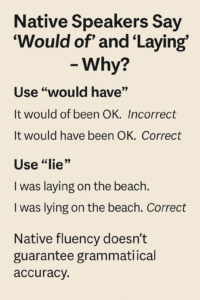Native Speakers Say “Would of” and “Laying” – Why?-Grammar Puzzle Solved (13)
Native speakers are often admired for their fluency, but they aren’t always models of perfect grammar. Many people are surprised to learn that even fluent speakers make native speakers grammar mistakes regularly. One common puzzle in English involves hearing phrases like “It would of been OK” instead of “It would have been OK,” or “I was laying on the beach” instead of “I was lying on the beach.” These examples are typical native speakers grammar mistakes, so what’s really going on here?
The Mystery Behind “Would of” vs. “Would Have”
Use “would have” in standard grammar.
Use “would of” only appears in speech because “would’ve” (the contraction of “would have”) sounds very similar to “would of.”
Native speakers often write what they hear. Since “would’ve” and “would of” sound nearly identical in spoken English, this mistake is common in casual writing, text messages, or social media posts. However, “would of” is grammatically incorrect and should be avoided in all formal writing.
“Laying” vs. “Lying”: A Tricky Verb Pair
Use “lie” when someone is reclining or resting.
Use “lay” when someone is putting something down.
Many native speakers confuse these verbs because their forms overlap in irregular ways:
-
Present: lie (I lie down), lay (I lay the book)
-
Past: lay (I lay down yesterday), laid (I laid the book)
-
Present Participle: lying, laying
So, saying “I was laying on the beach” is incorrect unless you were physically placing something (like towels). The correct form is: “I was lying on the beach.”
Why Do Native Speakers Make These Errors?
Even native speakers learn by ear before they learn by rule. That’s why pronunciation influences spelling, and casual habits override technical grammar rules. Native fluency doesn’t guarantee grammatical accuracy.
Final Thought
Grammar mistakes like “would of” and “laying on the beach” are understandable but incorrect. Understanding the rules and correcting such usage will help anyone—native or non-native—communicate more clearly and professionally.

A university instead of an university:
https://grammarpuzzlesolved.englishlitnotes.com/a-university-vs-an-university/
Mustafa Kamal by W.F.Castle: https://englishwithnaeemullahbutt.com/2025/06/02/mustafa-kamal/
Anne Bradstreet-A Voice of Early American Poetry:
https://americanlit.englishlitnotes.com/anne-bradstreet/
T.S.Eliot as a Modernist Writer: https://englishlitnotes.com/2025/05/29/ts-eliot-modernist-poet/
Visit ChatGPT to explore the platform and interact with the AI: https://chat.openai.com
Discover more from Grammar Puzzle Solved by Naeem Ullah Butt
Subscribe to get the latest posts sent to your email.